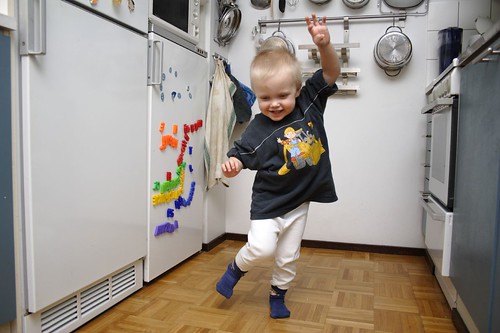There’s a scene towards the end of the movie WALL-E when the captain of the only remaining human ark-in-space realizes it’s time to go home to Earth. They’ve been away for generations. By any reasonable measure, he’s been successful. His ship is still flying. His people are still alive and procreating. Everything is running smoothly.
But, in his research, the captain falls down a hyperlinked-rabbit-hole of cultural practices that humanity has simply forgotten.
“Computer,” he says, prompted by the previous entry. “Define: dancing.”
Imagine an existence where we’ve forgotten about dancing! Would you consider that kind of existence ‘successful’?
DEFINE: SUCCESS
- The majority (if not the totality) of my kid’s classmates are going to miss their 11 year old dreams of becoming professional athletes. Does that mean they are tiny, delusional failures?
- Most of us will not end up as best-selling, mainstream authors. Does that mean there is no other way to consider ourselves successful?
Our job is to define success for ourselves. And not just “for ourselves” but “for now”, “for this year”, or even, “for today”.
Epic Wins
For me, writing this blog post is an epic win for today. I didn’t think it was going to happen. But I persevered, I found the time, and I went through the drafts required to make it readable and, I hope, inspiring.
For you, finishing the first draft of your first story in years might be today’s “epic win”.
- Or your epic win might be “finishing the second draft of a novel”.
- Or committing to writing 10K words of fiction this month.
- Maybe you’re writing so much that self-publishing makes sense, and you decide that ‘success’ means making $1000 a month from your writing in three years from now.
- Maybe you want to be making your entire living from your writing. That’s going to take a while to build up to, and you’re going to need other markers of ‘success’ along the way to keep you going.
What Does Success Mean To You?
If you’ve been writing for any time, it has probably been common for you to read articles with titles like these:
- What’s The Next Hot Publishing Trend?
- How To Write A Killer Query
- Your Cover Letter – What Agents Really Want To See
- 10 Steps To Achieving The Writer’s Dream (9 of which are about marketing yourself to publishers)
Most books on ‘writing’ end with a chapter or two on how to land an agent, find a publisher and retire on a pile of feather-filled pillows.[1. Maybe not that last one.]
Isn’t that putting the cart before the horse?
Practice Vs. Performance
I’ve played piano since I was 7 and guitar since not long after that. I sing. I knit. I pay someone to make me lift weights.
None of these are things I expect to do professionally. Nobody around me asks me when they’re going to see me on The Royal Variety Performance or in the Olympic Weight Lifting Team.
Even if I did aspire to do these things professionally, I would expect to spend years and years and years getting good at them before I even tried.
Not so with writing.
Tell someone you write, and they immediately ask ‘what have you published?” or ‘Have you written anything I might have read” (The only possible answer to which is: how would I know what you might have read?)
ACTION STEP-Write down answers to these questions:
- What is a writing ‘success’ I can achieve today?
- What does success look like one week from now?
- What would make me look back on Dec 31 and call this year a ‘writing success’?
- What would success look like next year?
- When I finish my next piece of writing, what will mark it a success? (Being finished? Being revised? Having someone else read it and not throw up? Sending it out to a publication even if it’s rejected? Having it accepted by a publication? Self-publishing it and getting three reviews?)
Your answers will vary depending on where you are in your writing practice. You answers will vary if you come back this time next year and do the same exercise.
Success Is Personal
Success is context-specific, time-limited, different for every piece of writing, and highly personal to you.
Don’t judge your career, your enjoyment, your sense of achievement by anyone else’s definition of success.
Write your stories. Celebrate your successes. Give yourself permission to write at your own pace, in your own way, and for your own reasons.
Liked this article? Please Tweet this
Start Your Fulfilling, Creative Life As A Writer

Join the free StoryADay Creativity Challenge and receive:
- Writers Roadmap: fit writing into even your busiest days
- Stay on Track Toolkit: overcome any creative challenge, no running out of ideas - ever
DON'T MISS OUT
ON YOUR LIFE'S CALLING


It’s so important to define success for yourself. Great post 🙂
Thanks. It’s hard to remember, even when you believe it as strongly as I do. Reading articles and books about writing send me scurrying back to this mantra!